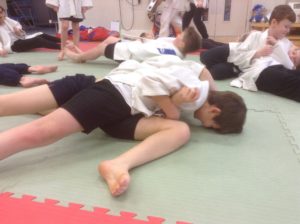Rainbow Factory Volunteers
To support us on our trip to the Rainbow factory on Wednesday 18 April, we’d like five parent volunteers. If you’re able to come along and help us on the trip, then please let a member of the F2 team know.
Thanks.
Mimika Theatre
This week, some children had the chance to watch the Mimika theatre company present ‘Landscapes’ within a white, domed-shaped tent. The performance explored the diversity and complexity of the natural world.
‘Landscapes’ uses a variety of techniques including puppetry, an image based story line, an immersive stereo soundtrack and a variety of sensory events and visual effects to involve and engage the audience.
Before the performance began, the children were introduced to two of the puppets (the snake and the crocodile).

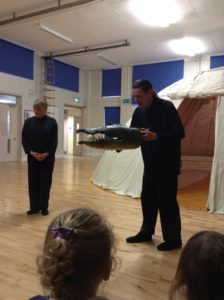
Then we took a seat inside the dome…we were all very excited!
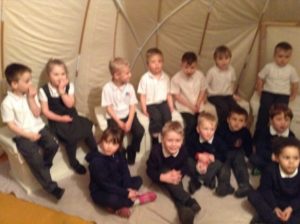
We watched in wonder as a story unfolded through four different landscapes (desert, rainforest, sea and the Antarctic).
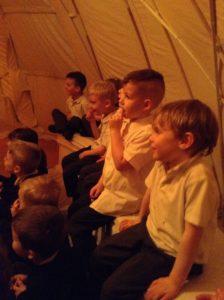
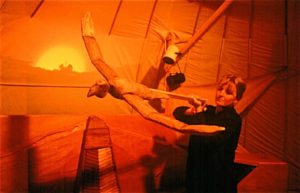

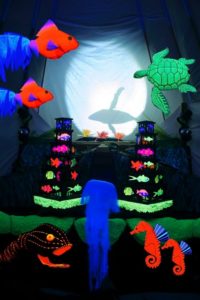
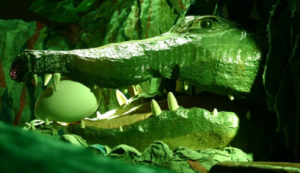
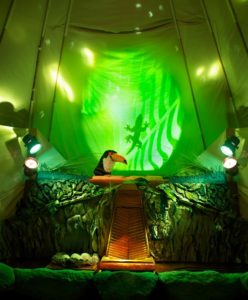
People who help us…nurse visit!
This week we had some special visitors in F2.
As part of our ‘people who help us’ topic, Ruth and Sarah (a hospital nurse and a community nurse) came to visit us. They spoke to the children about how they care for people at home and in hospital.
They asked the children what the role of a nurse is?
- “Put plasters on.”
- “Might do an x-ray if somebody get hurt on their bone.”
- “Help you get healthy.”
They brought some of their equipment (stethoscope, bandages, heartbeat monitor) to show the children. They showed the children a stethoscope and explained how they use it to listen to a person’s heartbeat and their breathing. They modelled how to dress a wound using a bandage. The children talked about their experiences of bandages:
- “If your hand is bleeding you need to put it on your hand.”
- “One day when I was riding on my bike I fell off and daddy put one on my hand.”
- “I hurt my elbow and had it all up my arm.”
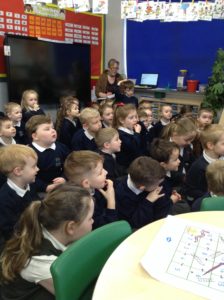
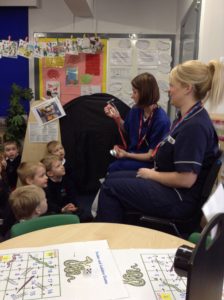
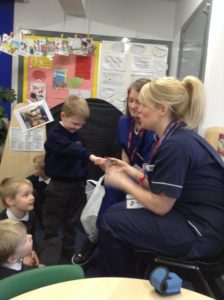
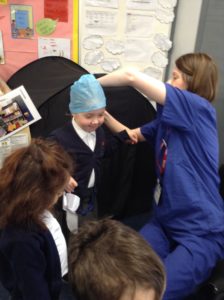
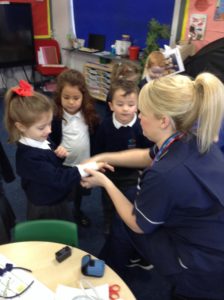
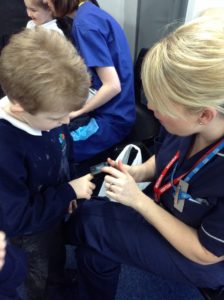
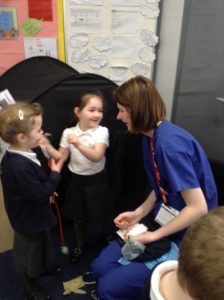
We’d like to say a big thank you to Ruth and Sarah for coming in to see us. We’d love to have more visitors to talk about their job and how they help others. Please speak to a member of the F2 team if you are interested.
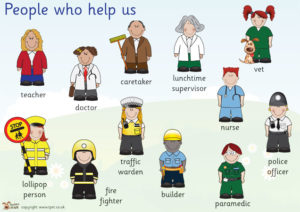
Play dough!
The children are really enjoying the self-serve play dough area where they can follow a recipe and make their own play dough! A few children have asked to take their play dough home so here is a recipe if you’d like to make it at home:
Ingredients
- 1/2 cup water
- 1/4 cup salt
- 2 cups flour
- food colouring
Method
Mix together the ingredients – simple!
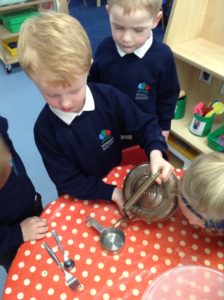

Play dough is a fantastic way to support your child’s fine motor skill development and also for imaginative play.
World book day
I’m sure many children were disappointed today when they couldn’t come to school in their book day costumes! Therefore, we have decided to re-schedule World Book Day to Monday 05 March. Your child can come to school as their favourite book character – just as was planned for today. We’d also like to invite parents to stay and read with their child at school drop off from 8.50-9.20am.
If your child is swimming on Monday, please bring some clothes that will be easier for them to change into after swimming.
Snow!
We hope your child is enjoying the snow outside. Extreme weather changes like this can initiate interesting conversations about the world around us. It would be great to hear what your child has been talking about whilst playing in the snow. This would be a fantastic opportunity for us to gain a holistic view of your child’s understanding of the world around them. Photos and your child’s direct quotes can be emailed to: scholesf2@spherefederation.org. Please don’t worry if they’re not grammatically correct – we want to hear what your child has said.
We’re looking forward to hearing what your child has been up to in all of the snow! Have fun!
Littering
A child in Foundation class found a piece of rubbish on the floor whilst in the playground. We were very impressed when he chose to pick it up and put it in the bin. This started a class conversation about littering and how to look after our environment. We talked about why we need to put rubbish in the bin.
- “Someone could slip on it and break their bones.”
- “The animals might eat it and be sick. The animals might give it to babies and then they could eat it and die.”
We talked about what to do with our own rubbish and what we could do if we saw rubbish on the floor.
- “Put it in the bin!”
- “Pick it up!”
We also talked about keeping ourselves safe if we did see rubbish on the floor. The children decided they could ask an adult if it was safe to pick up litter and put it in the bin.
After talking about littering, we decided to write posters to remind people to put rubbish in the bin.



We then went to speak to other classes in the school to share what we had discussed and give each class a poster to remind people to put rubbish in the bin.
We were very impressed with Foundation’s mature understanding of how to look after our environment!
World Book Day
This afternoon, the Y6 children visited F2 to share stories. The children were put into pairs and then chose a story to read together. First the F2 children listened to a story read by the Year 6 children and then the F2 children read one of our Biff, Chip and Kipper stories to them. The F2 children enjoyed reading to the older children.
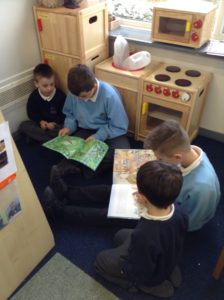
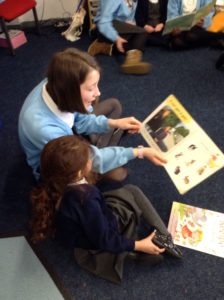


We are looking forward to welcoming parents/carers to our third stay and play session (stay and read) on Thursday 01 March 8.50am – 9.20am or 2.45pm – 3.15pm.
The children are very excited about coming to school dressed as their favourite story book character. We (the Foundation 2 staff) will also be dressing up as characters from a storybook.
Learning to count…
This week, we’ve been looking at the number 11. We have introduced the children to the vocabulary ‘tens’ and ‘ones’. The children have learnt that to make the number 11 we need one big ten and one one.

The children have enjoyed making a big number-line by ordering the numerals 1-20.


They have also enjoyed answering questions such as:
- which number is two more than eleven?
- which number is two fewer than eight?
- which number has one big ten and 6 ones?


Ask your child to tell you how to make the number 11. Please send us an email to share how your child has made the number 11. Your child will receive two challenge bricks for practising at home!
KEIOTSUKE (attention) – we’re doing judo!
All classes in school enjoyed some judo this week. Reception and Key Stage 1 were introduced to judo by Glynn from Sportif Judo and were thoroughly active for the full session – foot grabbing, pushing, pinning and bulldozing each other!



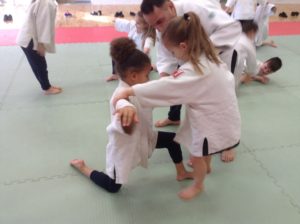
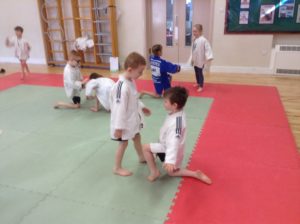

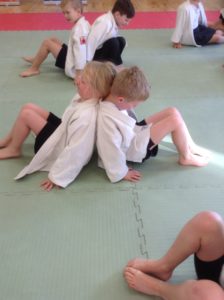
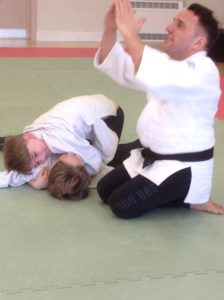
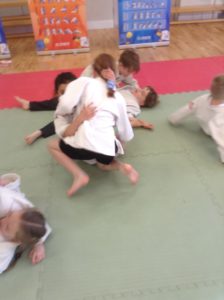

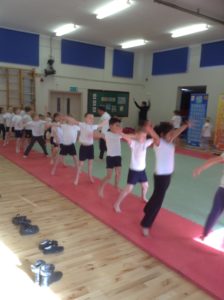

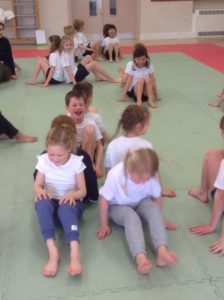

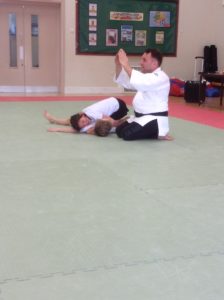

The Key Stage 2 classes also experienced a second session, building on skills from last month. They improved and developed their pinning, rolling and throwing techniques. If you’d like to continue judo, fliers were sent in book bags.


